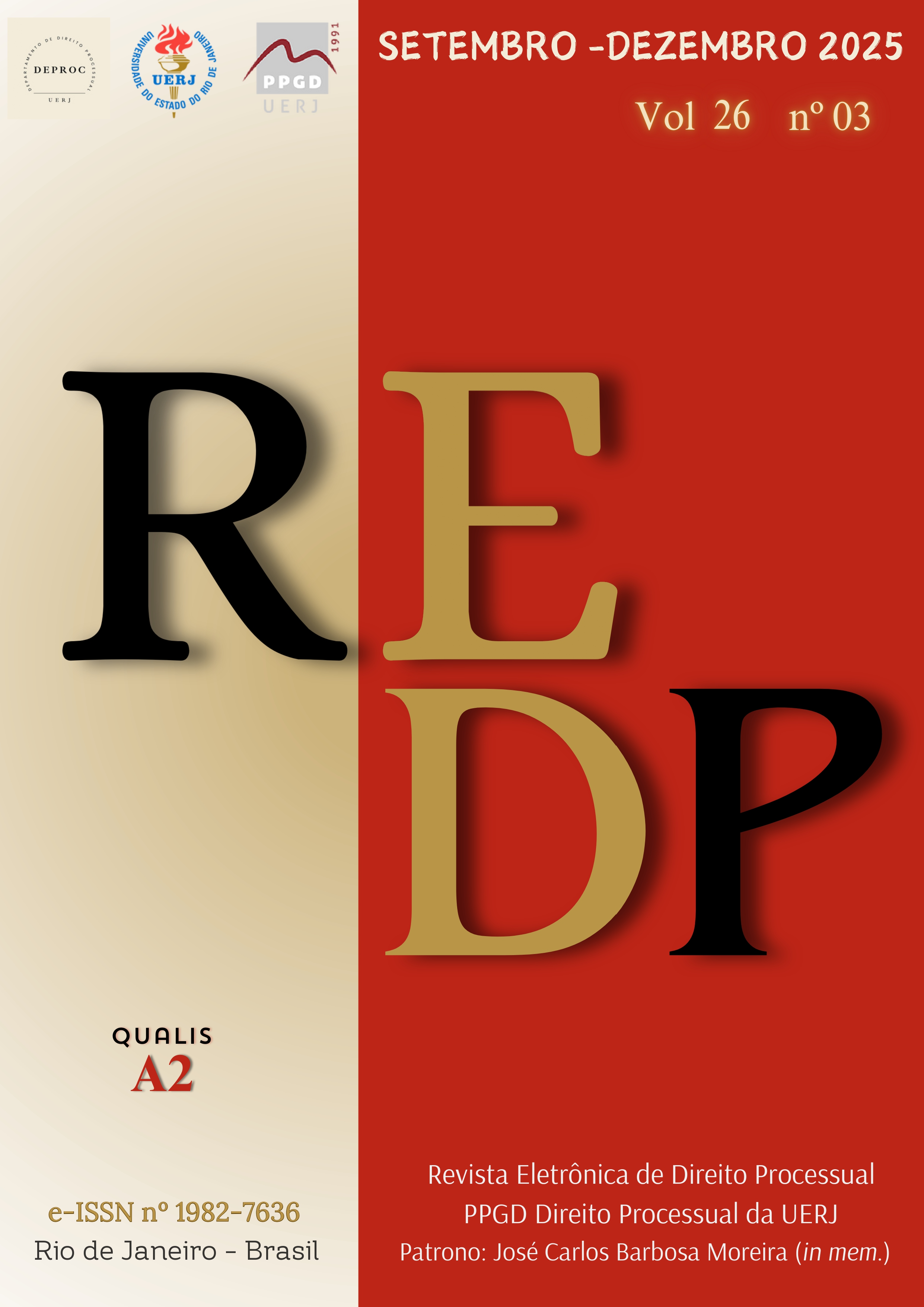O CONFLITO DE COMPETÊNCIA ENTRE A JUSTIÇA ARBITRAL E A JUSTIÇA ESTATAL NO BRASIL
DOI:
https://doi.org/10.12957/redp.2025.89619Resumo
O conflito de competência é um incidente processual regulado no Código de Processo Civil que tem gerado diversos debates na doutrina, em razão do necessário equilíbrio entre a justiça arbitral e o Poder Judiciário. Nesse sentido, um estudo da Fundação Getulio Vargas fez um levantamento de todas as decisões em conflito de competência no âmbito do Superior Tribunal de Justiça, desde a publicação da Lei 9.307/1996, a Lei de Arbitragem até julho de 2024. O problema de pesquisa consistiu em avaliar se o posicionamento do STJ em processos de conflito de competência é favorável ao instituto da arbitragem no Brasil. Tendo em vista a competência exclusiva do Tribunal para apreciar a matéria, a delimitação das hipóteses em que a competência do tribunal arbitral não é reconhecida é mais precisa. Foram encontrados 17 acórdãos que trataram, especificamente, sobre o conflito de competência entre a justiça estatal e a justiça arbitral ou sobre a declaração de competência do tribunal arbitral. A análise de cada acórdão revelou que em apenas três casos de CC entre um Juízo estatal e um arbitral o STJ não reconheceu a competência do tribunal arbitral. Os fundamentos dessas decisões tratam de hipóteses bastante específicas, consolidadas tanto na doutrina quanto na jurisprudência, o que permite afirmar que o STJ prestigia fortemente o instituto da arbitragem no país, alinhado aos melhores parâmetros de segurança jurídica internacionais. Este artigo compila e aprofunda sobre cada um desses resultados.
Downloads
Publicado
Como Citar
Edição
Seção
Licença
Copyright (c) 2025 Humberto Dalla; Fernanda Bragança, Peter Sester

Este trabalho está licenciado sob uma licença Creative Commons Attribution 4.0 International License.
Todos os artigos publicados na Revista Eletrônica de Direito Processual (REDP) (Departamento de Direito Processual, Universidade do Estado do Rio de Janeiro, Brasil) são licenciados por meio de uma Licença Creative Commons - Atribuição 4.0 Internacional (CC BY 4.0).
Os autores retêm os direitos autorais de seu artigo e concordam em licenciar seu trabalho com a licença CC BY 4.0, aceitando assim os termos e condições específicos desta licença disponíveis no seguinte website: https://creativecommons.org/licenses/by/4.0/legalcode.
- Os autores concedem à REDP o direito de primeira publicação, de se identificar como publicadora original do trabalho e concedem à revista uma licença de direitos não exclusivos para utilizar o trabalho das seguintes formas: Reproduzir, vender e distribuir cópias eletrônicas ou impressas do manuscrito como um todo, de partes específicas do manuscrito e de suas traduções para qualquer idioma;
- O uso do artigo por terceiros é livre, contanto que a integridade da publicação seja mantida e seus autores originais, periódico de primeira publicação e detalhes de citação sejam identificados.
Dentro dos termos da licença, os autores podem entrar em acordos contratuais adicionais separados para a distribuição não exclusiva da versão publicada do trabalho na revista.
Copyright and Licensing
All articles published in the Procedural Law Electronic Review (REDP) (Department of Procedural Law, State University of Rio de Janeiro, Brazil) are licensed under a Creative Commons License - Attribution 4.0 International (CC BY 4.0).
- Authors retain copyright to their article and agree to license their work under the CC BY 4.0 license, thereby accepting the specific terms and conditions of this license available at the following website: https://creativecommons.org/licenses/by/4.0/ legal code.
- Authors grant REDP the right of first publication, to identify itself as the original publisher of the work, and grant the journal a non-exclusive license to use the work in the following ways: Reproduce, sell and distribute electronic or printed copies of the manuscript as a whole, of specific parts of the manuscript and its translations into any language;
- Use of the article by third parties is free, as long as the integrity of the publication is maintained and its original authors, first publication journal, and citation details are identified.
Within the terms of the license, authors may enter into separate additional contractual agreements for the non-exclusive distribution of the published version of the work in the journal.




